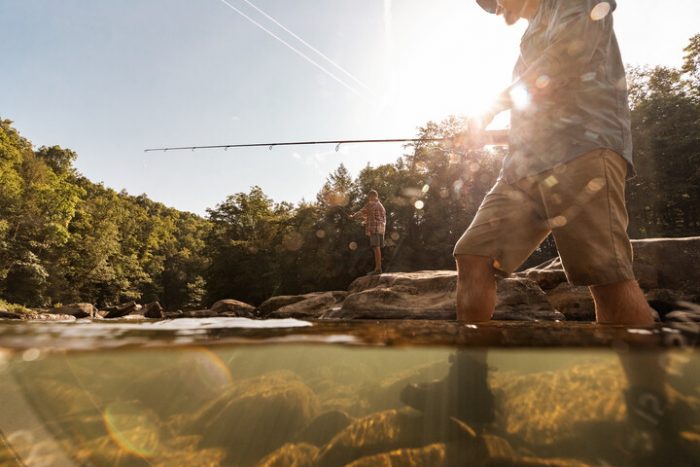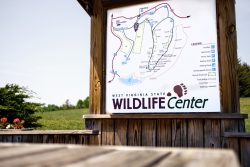Native species refer to wild animals and plants that have evolved in a particular region and environment. Non-native, or exotic, species are often introduced from other regions or countries accidentally, intentionally, or through habitat change induced by humans or nature. Often these non-native species have no natural control in the area where they are released, allowing their population to increase rapidly. Exotic species often out-compete native species and replace native species our natural plant and animal communities. Oftentimes, invasive non-native plants become pest species, taking over large areas of land and becoming difficult to control or eradicate. Two of the most invasive species that occur in West Virginia are purple loostrife and garlic mustard.
It is important to plant native species when possible because they are adapted to the area and are more disease and drought resistant than non-native species. Native plants also provide the greatest benefits to wildlife because our native wildlife evolved with native plants. Often the food provided by native plants is the most nutritious to our native wildlife.
Fortunately, more nurseries are specializing in native plants every year. Below are some nurseries that propagate and sell native plants, and some even offer installation services. The nurseries located in West Virginia are listed first. Out-of-state suppliers were selected for this list based on a these criteria: located within about 100 miles of WV, offer mail order or installation service, and have a high percentage of native plants in their stock. A percentage of native plant stock for each nursery is given at the end of each listing when known. This list is not meant to be inclusive nor is it an endorsement by the WV Division of Natural Resources of any individuals or businesses.
Use the following keys to choose the type of nursery plant materials, and services that you are looking for.
H = Herbaceous (may include annuals, perennials, ferns, grasses)
I = Offers installation services
MO = Mail Order
S = Seeds
SH = Shrubs
T = Trees
W = Wetland plants or aquatics
| West Virginia Suppliers |
|---|
| Virginia Winston Landscape Design & Garden 1121 Hollida Lane Martinsburg, WV 25404 (304) 267-6924 Email: virginia@winstongardens.com SH, T 100% |
| Native Garden Design Josh Meadows or Trey Flemming Rt. 2 Box 484 Salt Rock, WV 25559 Day (304) 541-0184 Eves (304) 736-6219 I, SH 100% |
| Grounds For Nature Contact: Terra DeMedici PO Box 1211 Hedgesville, WV 25427 (304)258-3687 H |
| Sunshine Farm & Gardens HC 67 Box 539B Renick, WV 24966 (304) 497-2208 www.sunfarm.com H, SH, T, W 50% |
| West Virginia Division of Forestry Clements State Tree Nursery PO Box 8 West Columbia, WV 25287 (304) 675-1820 MO, SH, T |
| Spaulding Landscaping and Homeview Farm Rt. 1 Box 39 Sheperdstown, WV 25443 (304) 876-2096 Email: homeviewfarm@aol.com H, I, SH, T 15% |
| Out-of-State Suppliers |
|---|
| Atlantic Star 620 Pyle Rd. Forest Hill, MD 27050 (470) 838-7950 Email: atlantic@iximd.com |
| Bowman’s Hill Wildflower Preserve PO Box 685 New Hope, PA 18938 (215) 862-2924 FAX (215) 862-1846 www.bhwp.org/native> MO, S 100% |
| England’s Herb Farm 33 Todd Rd. Honey Brook, PA (610) 273-2863, FAX (610) 273-2556 I, MO, H, W 80% |
| Environmental Concern PO Box P, St. Michaels, MD 21663 (410) 745-9620, FAX (410) 745-3517 www.wetland.org SH, T, W 100% |
| Gary’s Perennials 1122 E. Welsh Road Maple Glen, PA 19002 (800) 898-6653, FAX (215) 628-0216 MO, H, W 20% |
| Lower Marlboro Nursery PO Box 1013 Dunkirk, MD 20754 (301) 812-0808 FAX (301) 812-0808 Email: mssd@erols.com MO, T, SH, H, W 80% |
| Maryland Natives Nursery 9120 Hines Rd. Baltimore, MD 21234 (410) 529-0552 FAX (410) 529-3883 I, H, SH, W 95% |
| Musser Forests Inc. PO Box 340 Indiana, PA 15701 (724) 465-5685, FAX (724) 465-9893 www.musserforest.com MO, T, SH, H, W 50% |
| Native Seeds 7327 Haefork Ln. Gloucester Point, VA 23062 (804) 642-0736 MO, H, S, SH, T, W 90% |
| Pinelands Nursery 8877 Richmond Rd. Toano, VA 23168 (800) 667-2729, FAX (609) 298-8939 Email: wetland@widomaker.com MO, H, SH, T, W 99% |
| Riverview Herb Farm 49607 State Rt. 338 Racine, OH 45771 (740) 247-4565 Email: riverviewherbs@juno.com MO, I, H, S, SH, S, T, W |
| Virginia Natives PO Box D Hume, VA 22639 (540) 364-1665 Phone & FAX Email: vanatvs@erols.com MO, H, SH, T, W 50% |
| Appalachian Nurseries, Inc PO Box 87 Waynesboro, PA 17268 (717) 762-4733, FAX (717) 762-7532 SH, T |
| Doyle Farm Nursery 158 Norris Road Delta, PA 17314 (717) 862-3134 MO, H, 75% |
| Ernst Conservation Seeds 9006 Mercer Pike Meadville, PA 16335 (800) 873-3321, FAX (814) 336-5191 www.ernstseed.com I, MO, H, S, SH, T 75% |
| Flickinger’s Nursery PO Box 245 Sagamore, PA (800) 368-7381, FAX (724) 783-6528 MO, T, SH, H |
| Heirloom Seeds PO Box 245 W. Elizabeth, PA 15088 (412) 384-0852, FAX (412) 384-0852 www.heirloomseeds.com MO, S, 80% |
| Land Reforms Nursery & Landscape 35703 Loop Rd. Rutland, OH 45775 (740) 742-3478 I, MO, H, T, S, SH, W 90% |
| Mary’s Plant Farm and Landscape 2410 Lanes Mill Road Hamilton, OH 45013 (513) 894-0022 FAX (513) 892-2053 MO, T, SH, H 25% |
| Native Seed, Inc. 14590 Triadelphia Mill Rd. Dayton, MD 21036 (301) 596-9818 FAX (301) 854-3195 Email: saund10449@aol.com MO, S |
| Octoraro Nursery 6126 Street Road Kirkwood, PA 17536 (717) 529-3160, FAX (717) 529-4099 H, SH, T, W 99% |
| The Primrose Path 921 Scottdale-Dawson Rd. Scottdale, PA 15683 (724) 887-6756, FAX (724) 887-3077 MO, H, 75% |
| Shooting Star Nursery 160 Soards Rd. Georgetown, KY 40324 (502) 867-7979 MO, H, S, SH, T, W 100% |
| Wetland Supply Co. 194 Goodview Drive Apollo, PA 15613 (724) 727-3772, FAX: (724) 727-3778 http://wetlandsupply.com/ I, MO, H, SH, S, T, W 99% |
Other Information
West Virginia Native Plant Society – Information
345 West Virginia Avenue
Morgantown, WV 26501
(304) 293-4797 X2493
A great source of native plant information including, photographs of plants native to your area and suppliers nationwide is the Lady Bird Johnson Wildflower Center website at www.wildflower.org.



